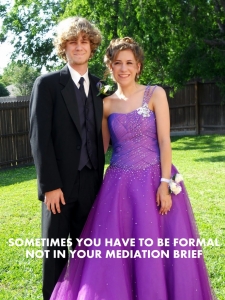The Mediator might rule against me.
Mediators do not make any rulings. The role of the mediator is to help the parties resolve the issues.
If I go to mediation, I will have to give up something.
Negotiation is about compromise. Each side usually gives up something. You won’t give up anything unless you, and only you, make the choice to negotiate a deal.
Mediation is too expensive.
Mediation is cheaper than litigation. It is efficient and eliminates other procedures which use up time and money.
Mediation is a waste of time.
Mediation has been shown repeatedly to be effective in resolving all issues. But even if you don’t conclude your case at the mediation, mediation typically allows parties to learn more about their opponent’s case—and their own. Issues are narrowed, setting the stage for further negotiation or more efficient litigation.
There is no reason to mediate—our case is a sure winner.
Mediation might be a place to test that hypothesis—or convince the other side. Presumably you wouldn’t be in litigation if there weren’t two sides to the story. If there is counsel on both sides, your opponent is spending time, money and effort for a reason. Applicants representing themselves might just need a forum to tell their story. Litigation is always uncertain. Settlement is the only way to retain control over the outcome, rather than let a judge impose a resolution on you.
We look like push-overs by suggesting mediation.
Mediation is the rule rather than the exception in most areas of law in the United States. The fact is that most cases settle at some point. Smart claims professionals and lawyers use every tool at their disposal to conclude cases as early as possible.










